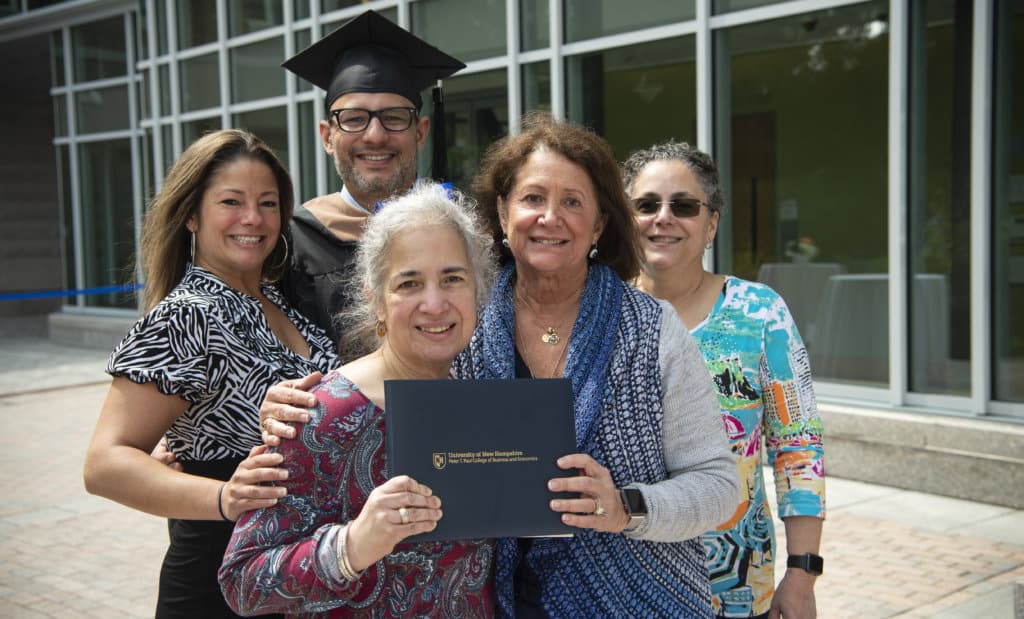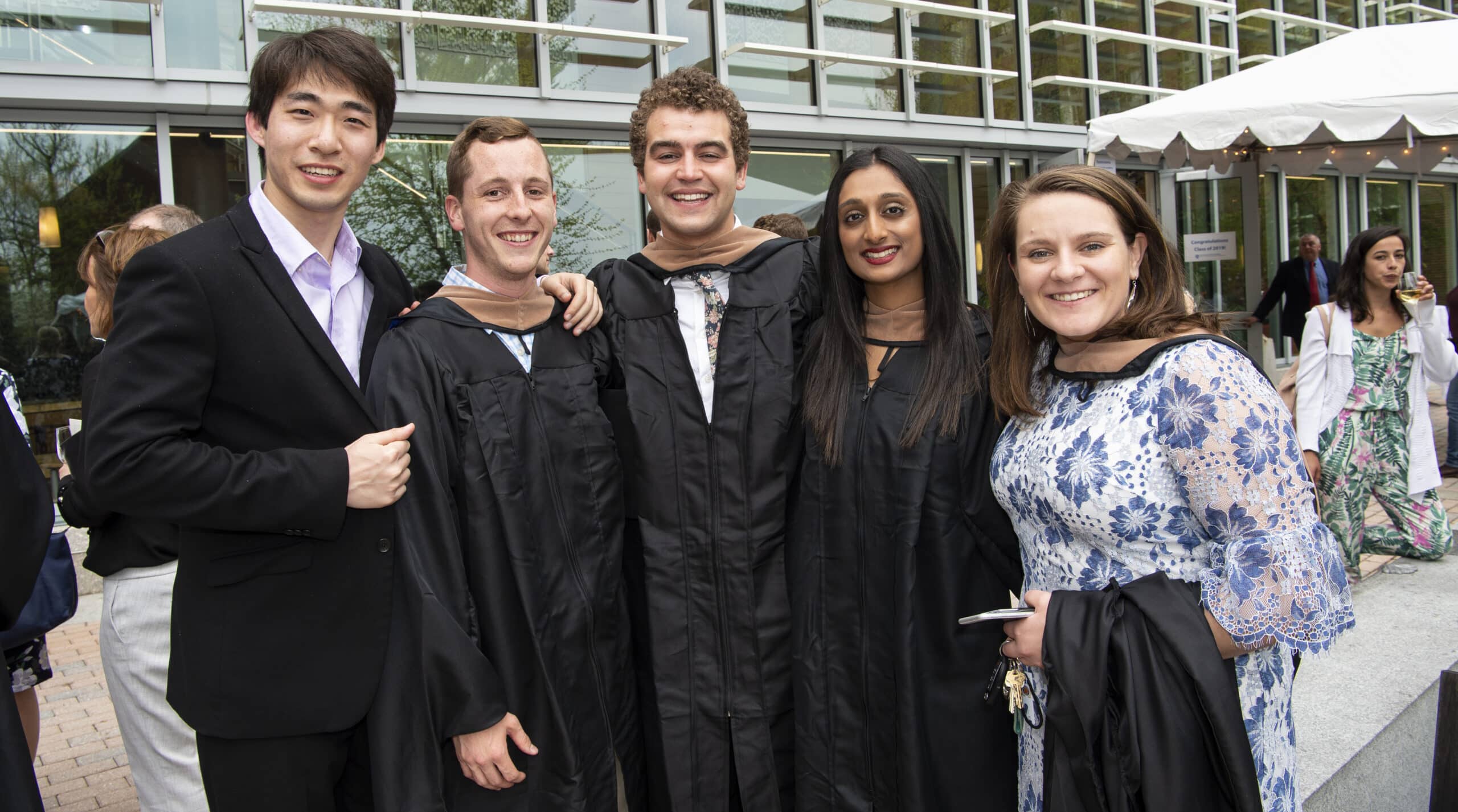International students do well in a campus where the professors are as diverse as their students. They feel seen, understood, and confident. Research has found that students who are placed in a classroom with a teacher sharing their ethnic or racial background experience a wide range of benefits, from higher test scores and lower rates of chronic absenteeism to higher rates of moving to to advanced programmes.
All of this builds up — leading to lower racial gaps in graduation rates. A degree then leads to better career prospects, income, wellbeing, physical health, and much more.
The importance of diversity in a business school is greater still. That smartphone you’re reading this from? Built on the capacity of global connections and supply chains. Learning the customs of other cultures outside of your home country is not only necessary — it’s now embraced. Simply put, it’s good business. These students and professors of Peter T. Paul College of Business and Economics are proof:
Wenjuan Xie

Wenjuan Xie. Source: UNH
After completing her PhD, China-born Wenjuan Xie went to teach at Peter T. Paul College of Business and Economics. The college, which is part of the University of New Hampshire, had a reputation for being a research powerhouse. It was also known for its diverse and congenial group of faculty and staff — the reason why Xie has enjoyed working ever since her first day.
Diversity is powerful and nurturing, according to Xie. “I truly believe a business student needs a global view and an open mind for inclusiveness and equity. I also believe students can learn a great deal, not just in terms of subject knowledge, but in comprehending the world, with the help of professors and professional staff who possess diverse visions,” she tells Study International.
The associate professor of finance speaks from experience — she was once an international student herself. Surrounded by peers from different countries helped expose her to many cultures and ways of living and cultivated her into who she is today, i.e. “an individual who embraces the idea of respecting differences and promoting mutual advancement”.
Devkamal (Dev) Dutta
It’s important to have “a global lab” while at business school. That’s what Dev Dutta, Associate Professor of Strategic Management and Entrepreneurship, believes.

Dev Dutta. Source: UNH
“When choosing a college or university, it is extremely critical for students to pick one that offers a diverse cohort coming from different geographies and cultures,” he says. “This is because the world of work is becoming increasingly global at this time. In order to be an effective employee and manager, it is essential to develop an appreciation for diversity and viewpoints of people from other cultures.”
Durham exudes a cosmopolitan feel too. This is because “Durham is a student-friendly, safe college town and people in New Hampshire value diversity of perspectives, ethnicities, and cultures,” says Dutta. “In addition, close by is Boston, which is a thriving metropolis with well-known institutions that receive a large number of international students each year.”
Ali Mara
Ali Mara seeks a borderless future. This is why learning about other cultures and people are important to him: “It changes your general perspective,” says the PhD Economics student from Albania. “Talking and interacting with other cultures have educated me and taught me a lot about the business and economic cultures in other countries.”
At Peter T. Paul College of Business and Economics, Mara gets to be part of a student cohort representing 72 countries. They enrich his UNH experience — and together with caring and dedicated lecturers, help him do well at school, “While I appreciate all the faculty members who have taught me, two that really stand out are Dr. Herring and Dr. Ozabaci. Both professors went above and beyond to offer their help and invaluable advice during my time in the programme especially during moments when I have been stressed out about my productivity.”
Fahimeh Ebrahimisadrabadi
Peter T. Paul College of Business and Economics was the obvious choice for Fahimeh Ebrahimisadrabadi when she decided to continue her studies. After five years of working in Iran, she returned to the college to undertake a PhD in economics, where she has made friends with both international and domestic students.
“Our programme is very diverse. We have people from Bangladesh, India, and China. The diversity gives us opportunities to learn from other cultures,” says Ebrahimisadrabadi. What really helped her assimilate into American culture were the gatherings and events that the UNH held. “Everyone here is super nice, friendly, and helpful, so much so that I want to spend more time getting to know them.”

Source: UNH
Hayley McDermott
For Master of Business Administration (MBA) student Hayley McDermott, the Durham-based university offered many chances for a domestic student like her to broaden her horizons. “In our International Business course, we learned about customs and proper business behaviour in other countries. We also took a trip to Quebec, which was an absolutely amazing cultural and cohort bonding experience,” she recalls.
Throughout the year, MBA students were assigned different teams each term, and this resulted in McDermott working with students from South Korea, Colombia, Germany, Sweden, and France. These experiences taught her patience when communicating with those who speak English as an additional language and pushed her to work in a team.
“I seldom travel, so working with them expanded my understanding of other cultures and inspired me to explore other countries,” McDermott explains. “In Andrew Earle’s “Creating Winning Strategies” class, he encouraged us to work in pairs for each essay with an international student or student of a different gender so that we could partner up with someone who has a different perspective from us.”
Follow University of New Hampshire’s Peter T. Paul College of Business on Facebook, Instagram, LinkedIn, and YouTube











